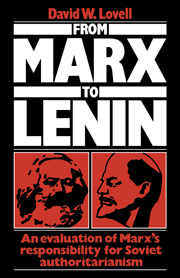5 - The Russian revolutionary tradition
Published online by Cambridge University Press: 05 November 2011
Summary
Any discussion of Marx's project and its influence upon Russia wouid be incomplete without reference to the Russian revolutionary tradition. For not only do some claim that Lenin was above all a Russian revolutionary, acting according to some longstanding Russian revolutionary imperatives in precipitating the October Revolution and in organizing the Soviet state, but the Russian revolutionary tradition itself was influenced in important ways by Marx and Marxism. This is not to imply that the Russian revolutionary tradition was monolithic; it was quite various. But within its diversity there were characteristic issues arising from a characteristic predicament. It was the predicament of a progressive, intellectual elite removed from, but confronted and challenged by, Russia's social problems. Thus the tradition dates from the Decembrist uprising of 1825, and not from the Pugachev rebellion of 1773–4, distinguished as a peasant war which aimed to return to the customs of pre-Petrine Russia. The Decembrists were, in the main, well-educated army officers who believed that the tsarist autocracy was the major obstacle to further Westernization, of which they themselves were among the first products. The failure of their revolt was due partly to their failure to utilize popular resentment against the Tsar: to their fear that their operation might become a mass uprising. The Decembrists were the first heroes, and martyrs, of the Russian revolutionary tradition. Their revolt embodied two themes which were enduring and basic to that tradition: the relationship between Russia and Western Europe; and the relationship between the revolutionary intelligentsia and the masses to whom the intelligentsia was ultimately dedicated.
- Type
- Chapter
- Information
- From Marx to LeninAn evaluation of Marx's responsibility for Soviet authoritarianism, pp. 119 - 141Publisher: Cambridge University PressPrint publication year: 1984

